In the ever-changing world of blockchain technology, smart contracts are emerging as a groundbreaking solution changing how transactions and agreements are carried out safely, efficiently, transparently, and reliably. As companies worldwide seek to tap into the potential of blockchain technology for greater efficiency and security, the demand for dependable, smart contract development services has increased dramatically.
Smart Contract Development Services offer an entry point to the future of decentralized applications that allow seamless, secure, and self-executing contracts. Utilizing cutting-edge blockchain platforms, hire smart contract developers that create custom smart contracts designed to meet your company's specific needs.
Understanding The Basics: What Are Smart Contracts
Smart contracts were first suggested in the 1990s by Nick Szabo, cryptographer and Juris Doctor. He suggested that data about contracts should be stored within Distributed Ledger Technology (DLT), which was then created to function as an online accounting book.
The goal was to convert the traditional contracts that could not offer alternatives to a modern, digital format. This occurred in 2015 when the network was launched on the market. It's a platform that uses blockchain to create decentralized applications (DApps). The company uses Ether, known as ETH or Ks, as its native currency.
The term "smart contract" is a digital document that specifies what is included in the agreement and facilitates its automatic execution. It's a program that encodes all transactions as well as any other processes necessary to complete an agreement. It operates independently and considers the procedures, financial systems, and communication with government authorities.
Smart Contract Development: 6 Points to Consider

You may be overjoyed by the potential smart contracts offer. We believe it's equally important to consider the potential limitations at the beginning of your development process.
Every new technology has its obstacles on the way to widespread adoption. So, let's look at the shortcomings of smart contracts to determine if they're something you'd like to invest your money in.
Defining the Purpose
Before you begin to dive deep into Smart Contract development services, it's essential to determine the intent and the scope of the contract in a transparent manner. Defining the particular purpose or business need for which will be addressed by the Smart contract developers will be addressed. It could be facilitating token transfers, signing a supply chain contract, or automating transactions in financial institutions. Having a fair goal will guide the design process and make sure that the Smart Contract aligns with the objectives it was designed to meet.
Considering Gas Fees and Select the Blockchain Accordingly
Gas charges refer to the transaction costs required to conduct the operations of a Blockchain network. When designing Smart Contracts, it's essential to consider the gas costs for different Blockchain platforms. Ethereum, for instance, is a preferred option for Smart Contract Development Services but can have high gas charges when there is a lot of congestion on the network. Look at alternative Blockchain platforms, such as Binance Smart Chain or Solana, that offer fees for transactions less than 40% and quicker confirmation times. Selecting the best blockchain will significantly affect the price as well as the performance of Smart Contracts.
Determining the Rules
Smart Contract operates based on defined rules and conditions encoded in the contract's code. It is crucial to establish the regulations precisely to ensure that the contract functions according to its intended purpose. Set out the terms for Smart Contract Planning execution, which includes the parameters for input, such as validation criteria, input parameters, and the actions that must be taken when the conditions are met. Utilize programming languages like Solidity to Ethereum and Rust to Polkadot to create clear and concise Smart Contract code that accurately conveys the intended principles and guidelines.
Prioritizing Security
Security is essential when designing Smart Contracts, as vulnerabilities within the code could cause serious negative consequences, such as losing funds or being exploited by criminals. Use the best practices to ensure Smart Contract security, such as input validation, access control mechanisms, and protection from common attack vectors such as Reentrancy and Integer Overflow. Security tools and frameworks such as MythX or OpenZeppelin can be used to run automated security audits and find weaknesses within the software. In addition, you should join the Smart contract developers community and take part in peer review in order to get feedback and improve the security of the Smart Contract.
Testing the Codes
Testing thoroughly is crucial to ensure the security and efficiency of Smart Contracts. Create a comprehensive testing plan that includes unit tests as well as integration testing—end-to-end tests to confirm the contract's performance under different scenarios. Utilize testing frameworks such as Truffle or Ganache to automate testing and test various scenarios, including boundary and edge case conditions. Conduct thorough testing in testnet environments prior to sending the contract out on the mainnet to find and fix any bugs or issues in advance.
Deployment Environment
The selection of the best deployment environment is crucial to the success of Smart Contract Development Services. Consider factors like scaling up the network, decentralization, and governance when choosing an environment for deployment. Explore different deployment options, such as public Blockchains, private consortium networks, and permissioned platforms, based on the requirements specific to the Smart Contract and the intended usage case. Be sure that the selected deployment environment aligns with decentralization, transparency, and decentralization intrinsic in Blockchain technology.
Benefits of Smart Contract Development
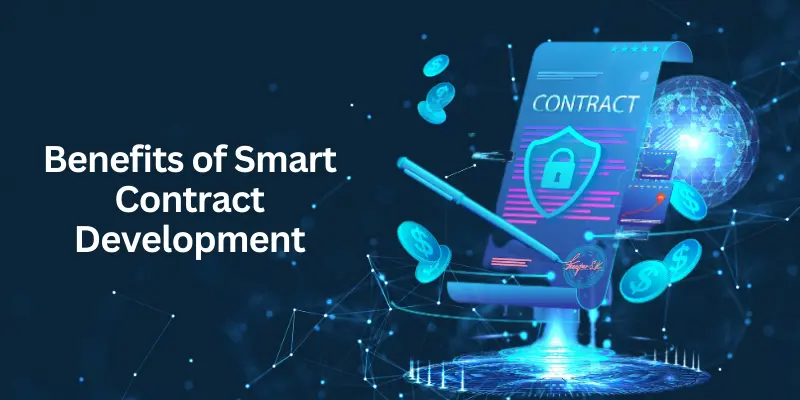
Smart contracts, which are self-executing agreements with the conditions of the contract directly encoded in code, can provide numerous advantages in diverse sectors. Here are the main benefits of developing smart contracts:
Security:
Smart contracts planning rely on cryptographic techniques that provide a high degree of security. Once implemented on a blockchain, they become impervious, making them invulnerable to manipulation and fraud.
Trust and Transparency:
Blockchain, the technology used to create smart contracts, provides transaction transparency by recording them in an uncentralized ledger. Transparency builds trust among the parties involved since each phase of the contract is verified.
Efficiency:
Automation is an essential component of smart contracts. By eliminating intermediaries, processes are optimized, reducing the time and errors humans make. This can be specifically useful in fields like supply chain and finance.
Cost Savings:
Smart contracts can cut costs associated with traditional contract execution, such as fees for legal, documentation, and third-party intermediary costs. Automation also reduces the chance of disputes, conserving resources.
Immutability:
These Smart Contract Development Services are permanent and tamper-proof when incorporated into the blockchain. This guarantees that the agreed-upon terms can't be changed arbitrarily, which adds a layer of security to the contractual agreement.
Global Accessibility:
Smart contracts can be accessed anywhere in the world and are particularly beneficial for international trade. They are based on a decentralized network, eliminating geographical limitations and decreasing dependence upon local institutions for financial services.
Speed of Execution:
Traditional contract processes typically involve lengthy approval processes and a lot of paperwork. Smart Contract Planning can be executed instantly once conditions are met, drastically reducing the time required to sign contracts.
Reduced Fraud:
The nature of cryptographic smart contracts improves their security, making them more resistant to fraud. The parties involved must be confident that the contract's terms are executed according to the program, reducing the chance of fraudulent actions.
Traceability:
Each transaction and every action in the smart contract is stored on the blockchain, making an auditable trail. This transparency enhances accountability and entirely records the contract's performance.
Decentralization:
Smart contracts run on decentralized blockchain networks, eliminating the necessity for a central government. This decentralization empowers control and access and distributes control among all participants on the network.
Customization:
Hire smart contract developers who can personalize to meet specific business needs. Whether it's a basic payment agreement or a more complex set of terms, the flexible nature of smart contracts allows for creating custom contracts to meet various requirements.
Environmental Impact:
Specific blockchain platforms utilized in smart contracting, like those that use proof-of-stake-based consensus mechanisms, are energy efficient compared to traditional proof-of-work systems. This may lead to a more sustainable and green method of conducting transactions.
Affirming the importance of smart contracts, the company provides businesses with a flexible tool that increases security, efficiency, and transparency across various applications, eventually revolutionizing the ways contracts and agreements are executed in the modern digital age.
Real-world Applications of Smart Contracts
Smart contracts can change industries by mining processes, increasing transparency, and encouraging trustless interactions. Here's a peek at a few of the newest applications:
Finance and Banking
-
-
Intelligent Loan Processing: Smart contract developers can automate loans, loan approvals, and payments based on predefined guidelines, eliminating the requirement for manual intervention as well as documents.
-
-
-
"Decentralized Finance" (DeFi): Smart contracts allow peer-to-peer lending as well as borrowing without the need for conventional financial institutions, possibly making it easier to access and lessening the cost of transactions.
-
-
-
Securities Trading: Automating the settlement process for trades via smart contracts could significantly decrease the time required to settle and reduce risk compared to traditional techniques.
-
Supply Chain Management
-
-
Real-time Tracking: Smart contracts monitor the movements of products throughout the entire supply chain, giving more transparency and guaranteeing product authenticity.
-
-
-
Automated Payments: Smart contracts could generate secure and automatic payments based on the satisfaction of certain conditions, such as the delivery of goods.
-
-
-
Inventory Management: Smart contracts are employed to automatically manage inventory levels automatically, decreasing the possibility of stockouts and maximizing resource allocation.
-
Healthcare and Insurance
-
-
Secure Medical Data Management: Smart contracts can securely store and manage patient information and provide controlled rights to authorized individuals while protecting patient privacy.
-
-
-
Intelligent Claims: Smart Contract Planning can simplify the process of processing claims within the insurance industry, speeding the payout process and cutting administrative costs.
-
-
-
The Clinical Trial Management: Smart Contract could automate the conduct of clinical trials that are based on established protocols, increasing transparency and integrity of data.
-
What Smart Contracts Does Not Promise To Do
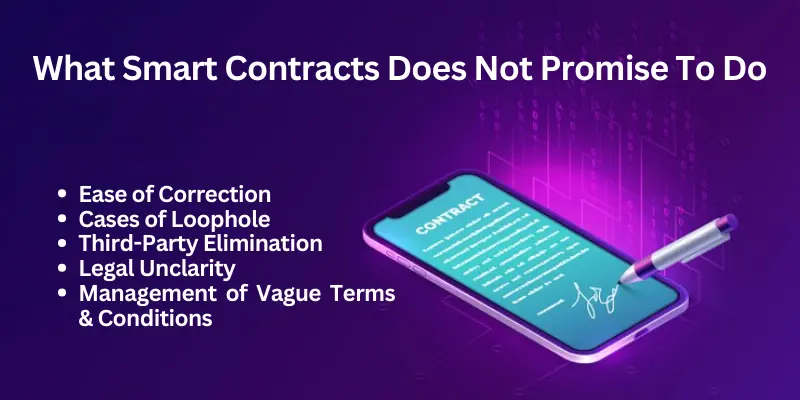
Although they have extensive benefits, Smart Contract Planning in blockchain still needs to be fully developed. They also have certain limitations.
If we consider this issue, let's look at the aspect that shines an eye on the weaknesses in the Smart contract idea that are rarely discussed.
Ease of Correction
As a Blockchain component, Smart Contracts come with the same advantages of immutability as blockchain. While this immutability sets security standards, a few restrictions are also a part of io.
Because it is almost impossible to alter any error in the code, it could be costly and time-consuming after the Smart Contract Development Services has been implemented.
Note: One option Smart contract developers employ to fix this is called de facto, which is the principle of mutability. While the code is in many ways impervious to change, developers apply the principle of de facto mutability by using code fragments in other contracts and having the addresses of the contracts they want to call stored in the mutable storage.
Cases of Loophole
Inconsistency in the "implied covenant of good faith as well as fair and equitable dealing'. Under US Law, there is the concept of Good faith, which states that the parties involved will conduct business fairly and will not rob one another of the benefits from the contract.
However, with Smart Contract planning, it isn't easy to ensure that the terms and conditions are fulfilled according to implied terms.
If you purchase an authenticated tennis ball, you will receive a ball that has been forged. Under normal conditions, you'd be able to bring the matter to a tribunal based on the Contract Law, but with Smart Contracts, the case is virtually nonexistent.
Third-Party Elimination
One of the main problems associated with Smart contract planning is the ease of eliminating third parties. Although the elimination of third parties is the premise that was established to be used in Blockchain or Smart Contracts, the idea in no way ends them.
For instance, lawyers. Although it's true that consumers will not be required to contact them to have the contract signed, Smart contract developers must communicate with lawyers in order to understand the conditions on which the smart contract is built.
In the final analysis, the involvement of third-party organizations will never go away; they only play a different role than they play in the smart contract that is not decentralized.
Legal Unclarity
Disputes play a crucial role in smart contracts within the blockchain ecosystem. When it comes to papers, it may occur as a result of an unclear statement such as "Sufficient Cause In Smart Contract", it can be triggered when the user makes a decision declaring there is a code fault.
To determine which side is correct, the users will eventually have to start a legal process - the primary motive Smart Contract was ever brought into existence.
There are many options available in handling disputes through Smart Contracts-
-
-
The only way to resolve disagreements within a Smart Contract is to rely on the votes. If there are several parties within the agreement, companies can hold a vote to determine which one is right.
-
Introduce the arbitrator(s) to be a judge in the event of disagreement.
-
This makes it essential to obtain the signatures of both parties before the contract can be signed.
-
Management of Vague Terms & Conditions
Smart Contract Planning consists of any implied terms and conditions that do not have to be all in both black and white. It is pretty simple for an innovative contract to handle transactions where only a handful of participants are involved, and the task they are required to fulfill is pretty straightforward. If you plan to introduce an event like the one in the illustration above, smart contracts will not perform correctly.
The inability to deal with vague TNCs is one of the most significant legal issues in the Smart Contract, and it needs immediate correction if the concept wants widespread acceptance.
These are just some of the problems that have surfaced. Front row, as Smart Contracts, are yet to be widely adopted. More will come in the coming months as the concept expands and finds a place as a core of every business.
In conclusion, so you, as a business, take a look at the benefits that come with Smart Contract Development Services, you will discover a variety of advantages to introducing the concept into your company; however, when you break it down to the bare minimum, a variety of issues arise, that can be addressed in a specific way.
Conclusion
Smart contract development services is an innovative technology poised to change how industries are conducted. With the ability to self-execute secure and transparent agreements similar to the blockchain platform, smart contracts can eliminate the requirement for intermediaries, increasing trust and simplifying processes. They could be used in various industries, including supply chain management, finance, and healthcare. They provide solutions to automate loans, secure management of data, and efficient claim processing.
Although challenges like ensuring solid security and interoperability across various blockchain networks are a constant concern, technological advancements in smart contract design will lead to an increasingly decentralized and automated future. As technology advances and is integrated with other emerging areas like artificial intelligence or IoT, smart contracts can transform how we interact with the digital world.







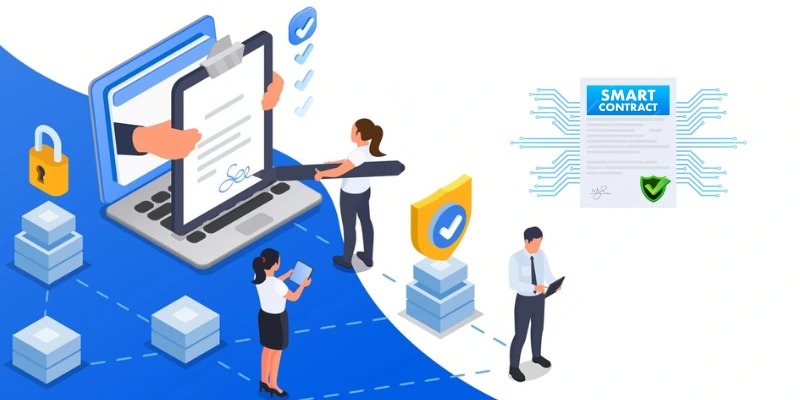
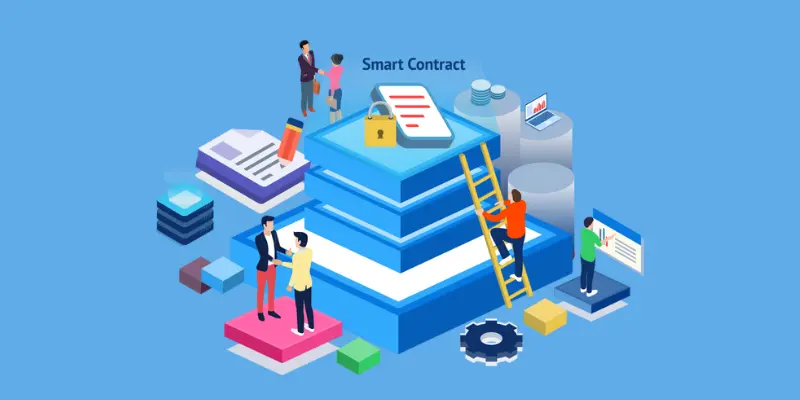
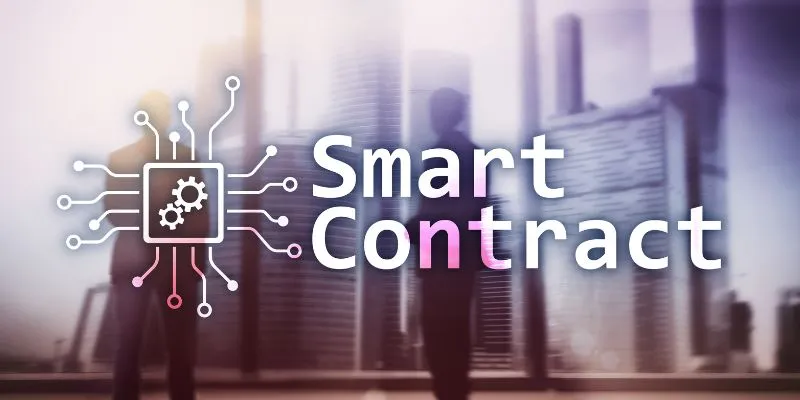



Share this blog